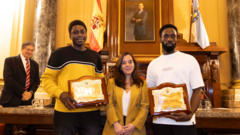In a moving ceremony in A Coruña, the Spanish city has bestowed the title of "adopted sons" upon two Senegalese migrants, Ibrahima Diack and Magatte N'Diaye, in recognition of their heroic efforts to intervene during a deadly homophobic attack in July 2021. This act of bravery followed the tragic murder of Samuel Luiz, a 24-year-old gay man who was assaulted by a mob outside a nightclub, leading to widespread outrage across Spain.
Mayor Inés Rey commended the men for their selfless actions, emphasizing that their willingness to risk their safety to assist the victim amidst a crowd of indifferent bystanders reflects a profound lesson about humanity and courage. Video footage from that night starkly contrasted the passivity of other witnesses, capturing the remarkable bravery of Diack and N'Diaye, who had been living undocumented in Spain.
During the ceremony, the mayor presented them with plaques that conferred their honorary titles, a powerful symbol of recognition for their courageous deeds. Both men humbly dismissed claims of being heroes, asserting that they simply acted according to their values. "We are not heroes, we did what we had to do," stated N'Diaye, while Diack reflected on the invaluable ideals instilled in him by his family, such as respect and education.
Their intervention not only highlighted the dangers faced by LGBTQ+ individuals but also brought to light the plight of undocumented migrants. Diack and N'Diaye later served as crucial witnesses in the trial that convicted the four assailants of Luiz's murder, leading to sentences ranging from 10 to 24 years. This case underscores ongoing challenges surrounding homophobia in Spain and the resilience of communities in the face of such adversity.
As Europe receives tens of thousands of irregular migrants yearly, primarily from African nations, stories like that of Diack and N'Diaye remind us of the intertwined narratives of migration, bravery, and the fight against prejudice. Their story stands as a testament to the power of individual action against systemic injustice, urging society to reflect on humanity and inclusivity.



















